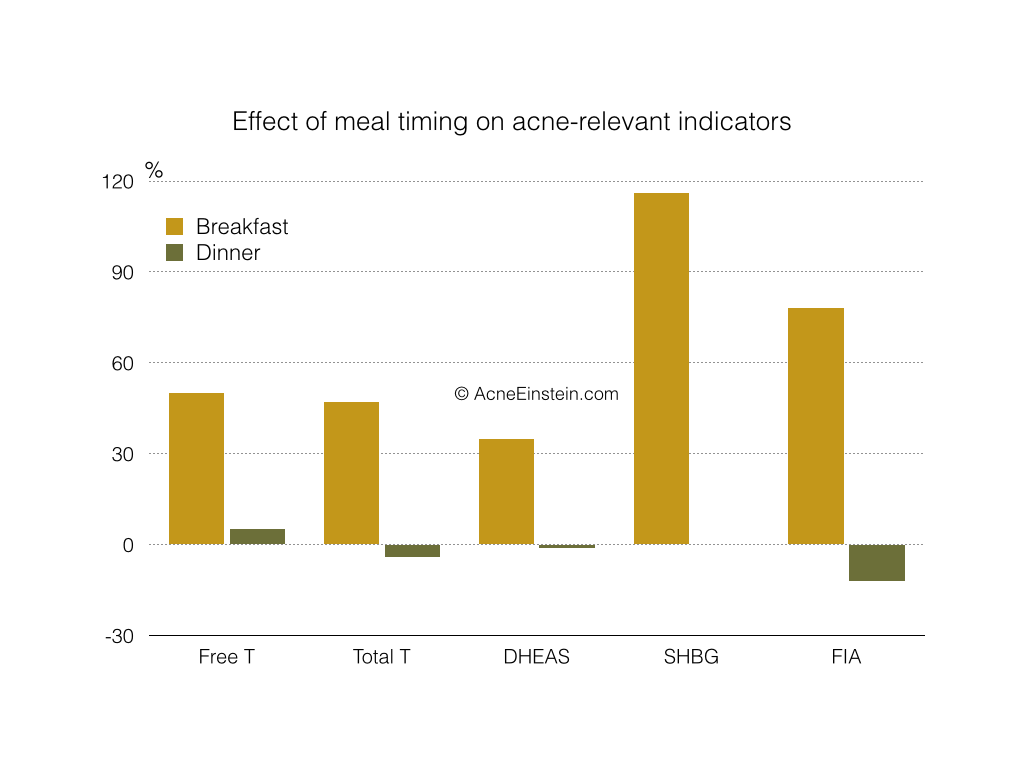When you eat your meals can be as important as what you eat, especially for hormonal-type acne. Just like light and darkness follows a daily rhythm, so do many hormones that regulate the functioning of the human body. Insulin is one of them, and it is generally accepted that insulin sensitivity is higher in the morning than evening. For example, in a 2012 study, the researchers gave healthy participants 3 identical meals to be consumed as breakfast, lunch, and dinner. The study showed insulin sensitivity was about 30% higher after breakfast than the other meals.
This means that carbohydrates eaten earlier have less of an impact on acne-causing hormones than carbohydrates eaten later.
You’ve probably heard that sleeping and waking up late throws off your body clock. It’s no longer tuned to the daily light-darkness cycle. There’s compelling evidence to show that this circadian mismatching increases insulin resistance and risks of many diseases. Meal timings can similarly shift the body clock; meaning that eating late in the evening can have similarly negative effects than sleeping late.
All of this means that eating more in the morning and less in the evening is better for hormonal acne. This was nicely demonstrated in a 2013 study where researchers divided 60 lean women with PCOS into 2 groups: breakfast diet (BD) and dinner diet (DD). Both groups consumed otherwise identical diets, but the BD group consumed most of their calories in the morning and DD in the evening. Here’s the caloric breakdown for both groups:
- BD: 980 kcal (55%) / 640 kcal (35%) / 190 kcal (10%) (breakfast / lunch / dinner)
- DD: 190 kcal / 640 kcal / 980 kcal
Here are the improvements in acne-relevant parameters after 90 days. I plotted this graph in a way that positive values mean improvements.

Source: Jakubowicz, D., Barnea, M., Wainstein, J. & Froy, O. Effects of caloric intake timing on insulin resistance and hyperandrogenism in lean women with polycystic ovary syndrome. Clin. Sci. 125,423–32 (2013). https://www.ncbi.nlm.nih.gov/pubmed/23688334
In a nutshell, there were significant improvements in all acne-relevant parameters in the breakfast group, while there was no before/after change in the dinner group.
It’s hard to overemphasize these results. These improvements are comparable, perhaps even better, than what’s seen with prescription drugs and rigorous exercise regimens. And yet, these women didn’t have to stick to a restricting diet. The only thing they did was eat most of the calories in the morning, i.e. in tune with the metabolic rhythms of the human body.
Other studies have come up with similar findings, but there’s no point to go through all of them. The take home message is that eating most of your calories early in the day and keeping dinner and evening meals as light as possible seems to reduce many of the hormones linked to acne.
Don’t take this to mean you can’t eat anything in the evening. It’s ok to eat in the evening if you are hungry. Just make sure to get most of your calories in early.
If you want to take this a step further, and I’m not sure it’s necessary, you might want to restrict carbohydrates in the evening. Given that insulin sensitivity peaks in the morning, it’s better to eat most of your carbohydrates early and make sure evening meals are predominantly fat and protein.

